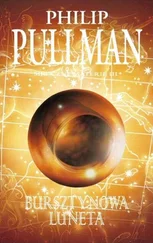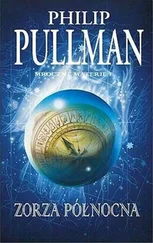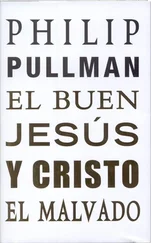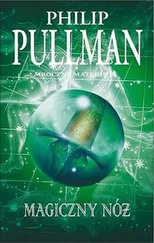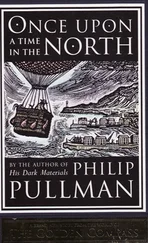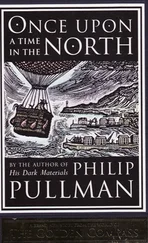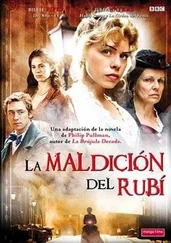Will stepped carefully across the grass in Cittagazze, counting his paces, holding in his mind as clearly as he could a memory of where the study was and trying to locate it with reference to the villa, which stood nearby, stucco-white and columned in a formal garden with statues and a fountain. And he was aware of how exposed he was in this moon-drenched parkland.
When he thought he was in the right spot, he stopped and held out the knife again, feeling forward carefully. These little invisible gaps were anywhere, but not everywhere, or any slash of the knife would open a window.
He cut a small opening first, no bigger than his hand, and looked through. Nothing but darkness on the other side: he couldn't see where he was. He closed that one, turned through ninety degrees, and opened another. This time he found fabric in front of him — heavy green velvet: the curtains of the study. But where were they in relation to the cabinet? He had to close that one too, turn the other way, try again. Time was passing.
The third time, he found he could see the whole of the study in the dim light through the open door to the hall. There was the desk, the sofa, the cabinet! He could see a faint gleam along the side of a brass microscope. And there was no one in the room, and the house was silent. It couldn't be better.
He carefully estimated the distance, closed that window, stepped forward four paces, and held up the knife again. If he was right, he'd be in exactly the right spot to reach through, cut through the glass in the cabinet, take out the alethiometer and close the window behind him.
He cut a window at the right height. The glass of the cabinet door was only a handsbreadth in front of it. He put his face close, looking intently at this shelf and that, from top to bottom.
The alethiometer wasn't there.
At first Will thought he'd got the wrong cabinet. There were four of them in the room. He'd counted that morning, and memorized where they were — tall square cases made of dark wood, with glass sides and fronts and velvet-covered shelves, made for displaying valuable objects of porcelain or ivory or gold. Could he have simply opened a window in front of the wrong one? But on the top shelf was that bulky instrument with the brass rings: he'd made a point of noticing that. And on the shelf in the middle, where Sir Charles had placed the alethiometer, there was a space. This was the right cabinet, and the alethiometer wasn't there.
Will stepped back a moment and took a deep breath.
He'd have to go through properly and look around. Opening windows here and there at random would take all night. He closed the window in front of the cabinet, opened another to look at the rest of the room, and when he'd taken careful stock, he closed that one and opened a larger one behind the sofa through which he could easily get out in a hurry if he needed to.
His hand was throbbing brutally by this time, and the bandage was trailing loose. He wound it around as best he could and tucked the end in, and then went through into Sir Charles's house completely and crouched behind the leather sofa, the knife in his right hand, listening carefully.
Hearing nothing, he stood up slowly and looked around the room. The door to the hall was half-open, and the light that came through was quite enough to see by. The cabinets, the bookshelves, the pictures were all there, as they had been that morning, undisturbed.
He stepped out on the silent carpet and looked into each of the cabinets in turn. It wasn't there. Nor was it on the desk among the neatly piled books and papers, nor on the mantelpiece among the invitation cards to this opening or that reception, nor on the cushioned window seat, nor on the octagonal table behind the door.
He moved back to the desk, intending to try the drawers, but with the heavy expectation of failure; and as he did so, he heard the faint crunch of tires on gravel. It was so quiet that he half-thought he was imagining it, but he stood stock-still, straining to listen. It stopped.
Then he heard the front door open.
He went at once to the sofa again, and crouched behind it, next to the window that opened onto the moon-silvered grass in Cittagazze. And no sooner had he got there than he heard footsteps in that other world, lightly running over the grass, and looked through to see Lyra racing toward him. He was just in time to wave and put his finger to his lips, and she slowed, realizing that he was aware Sir Charles had returned.
«I haven't got it,» he whispered when she came up. «It wasn't there. He's probably got it with him. I'm going to listen and see if he puts it back. Stay here.»
«No! It's worse!» she said, and she was nearly in a genuine panic. «She's with him — Mrs. Coulter — my mother! I dunno how she got here, but if she sees me, I'm dead, Will, I'm lost — and I know who he is now! I remember where I seen him before! Will, he's called Lord Boreal! I seen him at Mrs. Coulter's cocktail party, when I ran away! And he must have known who I was, all the time….»
«Shh. Don't stay here if you're going to make a noise.»
She mastered herself, and swallowed hard, and shook her head.
«Sorry. I want to stay with you,» she whispered. «I want to hear what they say.»
«Hush now …»
Because he could hear voices in the hall. The two of them were close enough to touch, Will in his world, she in Cittagazze, and seeing his trailing bandage, Lyra tapped him on the arm and mimed tying it up again. He held out his hand for her to do it, crouching meanwhile with his head cocked sideways, listening hard.
A light came on in the room. He heard Sir Charles speaking to the servant, dismissing him, coming into the study, closing the door.
«May I offer you a glass of Tokay?» he said.
A woman's voice, low and sweet, replied, «How kind of you, Carlo. I haven't tasted Tokay for many years.»
«Have the chair by the fireplace.»
There was the faint glug of wine being poured, a tinkle of decanter on glass rim, a murmur of thanks, and then Sir Charles seated himself on the sofa, inches away from Will.
«Your good health, Marisa,» he said, sipping. «Now, suppose you tell me what you want.»
«I want to know where you got the alethiometer.»
«Why?»
«Because Lyra had it, and I want to find her.»
«I can't imagine why you would. She is a repellent brat.»
«I'll remind you that she's my daughter.»
«Then she is even more repellent, because she must have resisted your charming influence on purpose. No one could do it by accident.»
«Where is she?»
«I'll tell you, I promise. But you must tell me something first.»
«If I can,» she said, in a different tone that Will thought might be a warning. Her voice was intoxicating: soothing, sweet, musical, and young, too. He longed to know what she looked like, because Lyra had never described her, and the face that went with this voice must be remarkable. «What do you want to know?»
«What is Asriel up to?»
There was a silence then, as if the woman were calculating what to say. Will looked back through the window at Lyra, and saw her face, moonlit and wide-eyed with fear, biting her lip to keep silent and straining to hear, as he was.
Finally Mrs. Coulter said, «Very well, I'll tell you. Lord Asriel is gathering an army, with the purpose of completing the war that was fought in heaven eons ago.»
«How medieval. However, he seems to have some very modern powers. What has he done to the magnetic pole?»
«He found a way of blasting open the barrier between our world and others. It caused profound disturbances to the earth's magnetic field, and that must resonate in this world too…. But how do you know about that? Carlo, I think you should answer some questions of mine. What is this world? And how did you bring me here?»
Читать дальше



